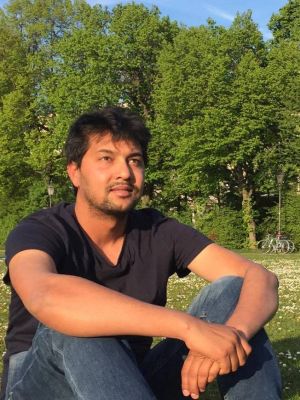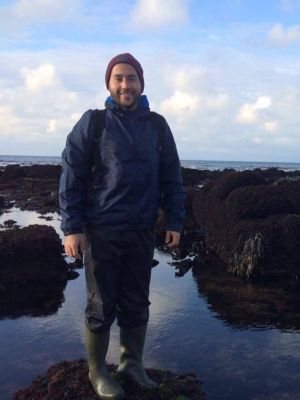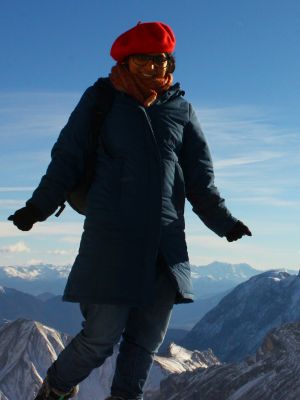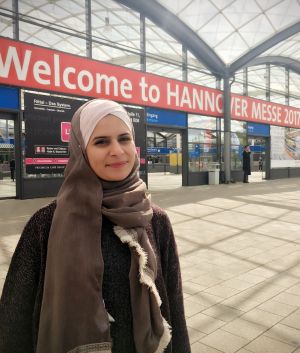We asked four DAAD scholarship holders from the Development Related Postgraduate Courses about their expectations and first impressions a few months after their arrival in Germany. What have they experienced in the meantime? How do they feel about daily university life in Germany? What do they like, what could be better? Sharad Mainali (Nepal), Shraddha Kulhari (India), Daniel Ortiz (Venezuela) and Saba Al-Sader (Palestinian Territories) answer.
“Germans are the most organised and loyal people that I know.”
Sharad Mainali, Nepal, “Land Management and Land Tenure” at TU Munich
How do you spend your free time in Munich?
I frequently go into the city and discover new places. Thanks to the efficiently built transportation network I also visit cities that are somewhat further away.
What do you like most about Germany?
I like many things about Germany. Germans are the most organised and loyal people that I’ve ever met. They would always help me when I least expected it: One time I dropped my wallet without even noticing. I got it back on the same day, because people instantly started looking for me. And when I was a little lost during a stay in Berlin, a woman came up to me and offered me her help. That was very impressive to me. The cultural festivals are very interesting to me. And German cities are very green – relaxing in the parks is my favourite pastime.
Which places in Germany would you still like to visit?
I definitely want to see the Alps, but Northern Germany interests me, too. I want to see how people there live. Due to their unique characters, small cities and towns are more exciting to me than larger cities – big cities are the same everywhere.
What do you like about your university – what could be better?
I like that students have the opportunity to test their own progress and develop their abilities and individual qualities. The daily life of students is very organised, and everything is systematic. The tight schedule and the long lectures are sometimes challenging for me.
“The right clothing and a glass of mulled wine – that’s how to survive the German winter.”
Daniel Ortiz, Venezuela, “International Studies of Aquatic Tropical Ecology” (ISATEC) at the University of Bremen
Have your expectations about Germany been met thus far?
My first few months here were just as I had expected. I met people from all over the world who expanded my horizons and honed my intercultural understanding. I also visited new places, such as the North Sea island Heligoland. Germany is incredibly beautiful! And of course I continue to learn the German language so I can become better integrated.
What is it like for you to study at the University of Bremen?
I appreciate the international atmosphere in my degree course and at the university as a whole. I’m also impressed by the extremely modern facilities as well as the high quality of the lectures. My master’s programme is very demanding, and it’s important to stay on the ball – but no pain, no gain.
When you arrived in Germany, it was summer. Was winter here a new experience for you?
I come from the tropics and was somewhat apprehensive of the cold, but to my own surprise, I survived my first winter here well. The right clothing and a hot glass of mulled wine now and then helped. More than the cold, the short days were difficult for me.
“The people of Munich are approachable and helpful.”
Shraddha Kulhari, India, “Master of Laws in Intellectual Property and Competition Law” at Munich Intellectual Property Law Center
How do you feel about your new home Munich?
Munich is a wonderful city with a lot of outdoor activities and culture. The Alps and the beautiful lakes are close, too. The people of Munich are very approachable and helpful – so I feel very much at home here.
Were there things that surprised you?
I wasn’t expecting the endless construction sites everywhere in the city. They’re understandable though. The good infrastructure has to be maintained.
What do you like most about your degree course?
The programme attracts a lot of international students who enrich the learning experience. We also have access to the incredible library at the Max Planck Institute for Innovation. I love being there.
What could be better?
Because my faculty is outside the university campus, we’re somewhat isolated in our degree course. That makes it hard to meet other students.
“My university routine gets easier every day.”
Saba Al-Sader, Palestinian Territories, “Renewable Energies” at the University of Oldenburg
What does daily life in Germany mean to you?
My routine gets easier here every day. The first couple weeks of the semester were critical. Not only were we provided with an introduction to our university subjects, we were also given a lot of information about Germany and especially Oldenburg. The German language course helped me get used to Germany quickly, too.
How easy was it for you to make new contacts?
During events and excursions, I met people with whom I developed true friendships. At conferences and workshops I was able to make a lot of valuable contacts for my professional network. I’m in contact with many DAAD scholarship holders, for instance.
What do you miss most about your home?
Beside some typical foodstuff like Taboon bread or the Arabic coffee, I miss the family gatherings and the way we celebrate some of them – particularly the special get-togethers in the month of Ramadan or on the Eids.
We already interviewed the scholarship holders shortly after their arrival in Germany. Read all about their first impressions here.









